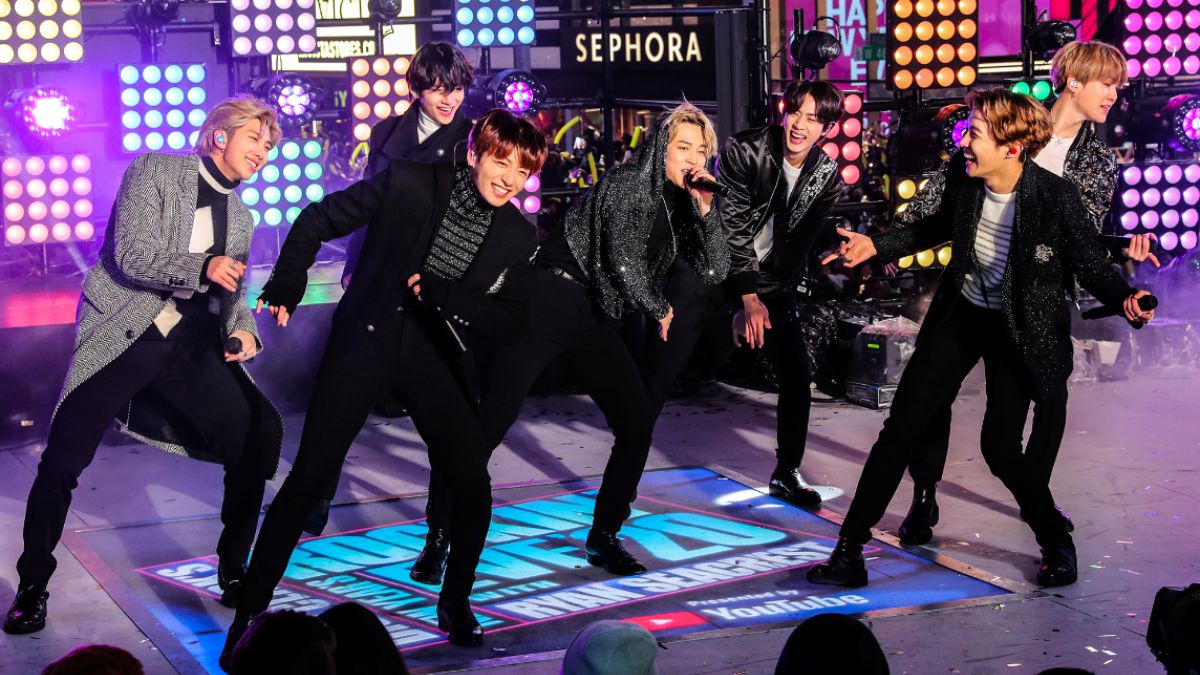- By Sukanya Saha
- Sat, 27 May 2023 06:06 PM (IST)
- Source:JND
Rise and Rise of Korean Pop Culture: In November 2012, a music video by a South Korean artist named Park Jae-sang, widely known as Psy, achieved a remarkable feat on YouTube by becoming the most-viewed video of all time. This video was created to accompany the popular song "Gangnam Style," which humorously parodied one of the wealthiest districts in Seoul. The video held this prestigious title for a duration of five years, prompting YouTube to raise its view count limit. Now, almost a decade later, the "Gangnam Style" video is approaching a staggering 4.5 billion views.
Psy's immense success on a global scale is often regarded as a significant milestone for the introduction of Korean pop culture to the Western mainstream. It marked a crucial turning point for what is commonly known as "Hallyu" or the "Korean wave," a term originating from China that describes the remarkable surge in popularity of South Korean pop culture worldwide.
Today, Korean culture has become extensively pervasive in Western society to the extent that K-pop idols are invited to the White House to address issues of anti-Asian hate crimes and promote Asian representation. A prominent example of this is the mega-pop band BTS, who had the opportunity to speak on these matters in June last year.
K-pop stars have also emerged as global ambassadors for prestigious luxury brands such as Dior, Louis Vuitton, Tiffany & Co, Céline, and, in the case of the all-female group Blackpink, Bulgari. Additionally, Korean series like Netflix's Squid Game have shattered viewership records, while Korean films, including Bong Joon-ho's Parasite, have garnered mainstream recognition and acclaim.

(Image credit: Twitter)
The value of South Korea's cultural content exports in 2020, encompassing various industries like music, movies, and broadcasting, surged to approximately $11.92 billion. This marked a notable increase of 16.3 per cent compared to the previous year, according to the South Korean Ministry of Culture, Sports, and Tourism.
The Emergence of Korean Pop Culture:
During the 2008 US election day, Korean-American Seung Bak and his business partner Suk Park, approached a Korean broadcaster's branch in Los Angeles. They brought along their savings of $50,000 and requested to obtain the licensing rights for Korean television dramas in order to stream them online.
At first, their request was met with perplexed gazes. The notion of non-Korean people watching Korean shows, let alone paying for them, seemed implausible. Would American TV viewers suddenly develop an interest in reading subtitles? Moreover, the concept of streaming was met with confusion—what exactly did it entail?

(Image credit: Twitter)
However, Bak and Park had already begun to observe a growing surge in the demand for Korean content not only in the US but also in other English-speaking countries. Fans were resorting to illegal methods like downloading or streaming pirated shows, exposing themselves to potential malware threats and enduring relentless pop-up advertisements. These dedicated fans took it upon themselves to collaborate and subtitle countless hours of melodramas, catering to the expanding community of non-Korean-speaking enthusiasts.
Overcoming Territorial Limitations:
It took several additional years for Netflix's streaming business to truly flourish and for "binge-watching" to become a popular pastime. During that time, it was challenging to envision the immense impact that South Korean cultural productions like BTS, "Parasite," and later "Squid Game" would have.
These works captured the world's fascination and fundamentally reshaped the concept of entertainment transcending geographical boundaries. Reflecting upon it now, the transformation seems almost unimaginable.
There was an inexplicable allure in these shows that ignited a passionate enthusiasm and a universal craving, transcending language and culture. This fervour spread rapidly, even before the concept of something "going viral" had become a part of common parlance.
Bak co-created DramaFever, a streaming platform that was eventually acquired by SoftBank, and later by Warner Bros. in 2016 for a nine-figure sum. While the site dabbled in sampling and exploring content from various regions, including Bollywood and Eastern Europe, it became evident that none of these offerings resonated with users as strongly as Korean shows did.

(Image credit: Twitter)
The phenomenon occurred within the realm of K-pop when fans enthusiastically delved into the world of stylishly crafted music videos and captivating dance routines readily available on YouTube. It transpired in the film industry when "Parasite" achieved acclaim by winning four Oscars, subsequently generating buzz around director Bong Joon Ho and other accomplished South Korean filmmakers.
Harmonisation Of Disparities:
K-pop music labels and talent agencies made deliberate endeavours to expand into international markets starting from the early 2000s. They recruited trainees from countries such as China, Japan, Thailand, and Asian Americans to form both girl and boy bands. Additionally, they released songs in languages other than Korean to cater to a broader audience.

(Image credit: Twitter)
Another significant catalyst was the remarkably organised fan bases that K-pop groups cultivated. These dedicated fans would stream new releases and music videos of their favourite artists as part of comprehensive social media campaigns aimed at generating hype for singles and albums.
The success of Korean movies took a different route. It stemmed from a combination of long-standing protectionist policies mandating Korean theatres to allocate a specific quota for domestically produced films and a thriving film industry that emerged in the 1960s following the abolishment of censorship. These factors converged to create a fertile ground for the growth and prosperity of Korean cinema.
Korean TV series initially gained traction in Japan and subsequently expanded their influence to China, before experiencing a surge in popularity throughout Asia. This phenomenon of "Korean wave" emerged with dramas that initially relied on melodramatic storylines and Cinderella-like themes.

(Image credit: Facebook)
However, as the industry became more lucrative and obtained larger budgets, Korean shows evolved in terms of production quality, diversified in genres, and strengthened in plot. This evolution has allowed the industry to cater to a broader audience and captivate viewers with a wider range of engaging content.
The advent of streaming platforms like Netflix has facilitated the crossover of Korean scripted series to the rest of the world, surpassing even the expectations of their creators. This unforeseen reception and popularity among global viewers have been a notable development for the creators and industry professionals involved in the production of these shows.
What The Winter Olympics' Ceremonies Told Us About K-Pop?
On February 9, 2018, during the opening ceremonies of the Olympics, athletes paraded in the Parade of Nations while a curated selection of K-pop hits played in the background. This deliberate choice reflected South Korea's desired image as a nation fully immersed in global culture.
These songs and artists exemplify the remarkable versatility of K-pop stars, showcasing their prowess in singing, comedy, rap, dance, and social commentary. The South Korean music industry has honed the pop production process into a vibrant assembly line, generating incredibly infectious tunes performed by exceptionally talented individuals in visually captivating music videos.
When Red Velvet sings the lyrics "Bet you wanna (bet you wanna) dance like this" in their single "Red Flavor," they convey a message to the world, portraying South Korea as a modern yet wholesome, vibrant, inviting, and a fun place to be.
K-pop Began In 1990s:
The existence of K-pop in its current form owes much to the advent of democracy and the role of television in South Korea. The country's transition to a democratic government in 1987, along with subsequent modernisation efforts and a relaxation of censorship, had a significant impact on television and its influence on the K-pop industry.
From 1995 to 1998, three influential music studios emerged: SM Entertainment, also known as SM Town, in 1995; JYP Entertainment in 1997; and YG Entertainment in 1998, founded by Yang Hyun-suk, a former member of Seo Taiji and Boys. These studios collectively embarked on a deliberate effort to nurture what would later be recognised as idol groups.
BTS Is The Most Famous Boy Band In The World:
Through their YouTube music videos garnering record-breaking views and their highly successful album sales, along with their immense earning potential as influential figures, the group generated $130 million in merchandise sales alone in 2019, as reported by The Hollywood Reporter. As a result, this seven-member K-pop sensation has achieved global fame and acclaim.
In 2010, the members of BTS were initially discovered by their current management company, Big Hit Entertainment, which is a prominent South Korean entertainment company. Once discovered, the newly recruited members embarked on a journey as trainees, undergoing intensive coaching and guidance to shape them into potential superstars. This comprehensive training programme included various aspects such as dance and vocal lessons, as well as instruction in acting and media skills.

(Image credit: Reuters)
In the summer of 2013, BTS made their official debut as a K-pop idol group consisting of seven members. Their debut album, "2 COOL 4 SKOOL," achieved a notable level of success, reaching the tenth position on a monthly Korean music chart just one month after its release. The album's title track, "No more dream," can be interpreted as a reflection on the challenges and societal pressures faced by Korean teenagers as they transition into adulthood.
Since then, the group has consistently broken records and achieved significant milestones. In 2019, BTS made history as the first K-pop artist to participate as presenters at the Grammy Awards. The following year, they further solidified their trailblazing status by becoming the first K-pop band to perform at the award show.
Korean Government Places K-Pop As Highest Priority:
The South Korean government has actively supported the dissemination of the country's cultural influence through music and media since the 1990s, contributing to the advancement of this phenomenon.
A 2020 report by BBC Culture states that the Korean wave has been strategically employed by the government as a form of soft power to stimulate the nation's economy. "South Korea isn't alone in this; many countries invest in cultural councils and exchanges partly to strengthen diplomatic aims. But the South Korean government’s push for cultural power has had remarkably quick success," it added.

